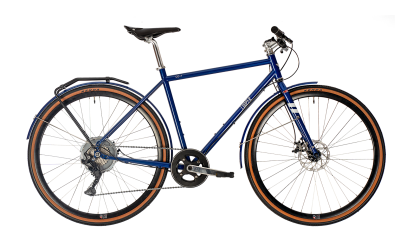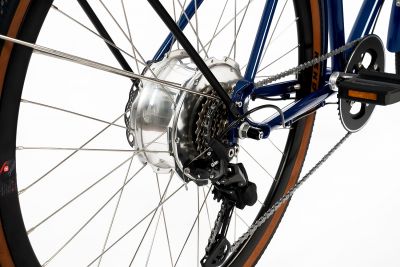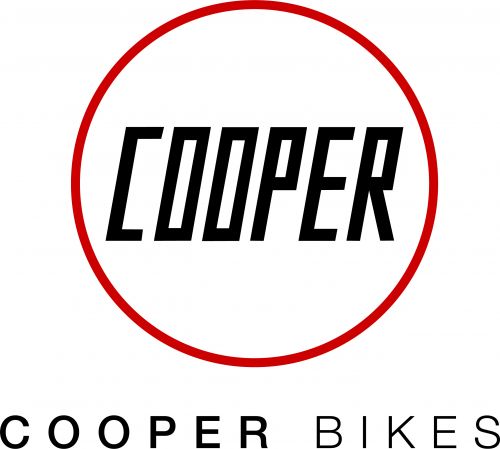LONDON (BRAIN) — Thanks to the Cooper family's notoriety in the auto industry, its new line of e-bikes has generated plenty of free press globally since its re-launch at The Cycle Show in London last week. The bike line is unlikely to be seen in the U.S. but features an innovative hub motor worth making note of.
BRAIN last wrote about the Cooper Bikes brand in 2012, when we encountered it at the Eurobike show. Ten years later, the line is quite different. Now all the Cooper bikes are electric and they are being manufactured in Germany by TechniBike GmbH, which licenses the brand from the Cooper family.
TechniBike sells bikes under its own name and recently added the Pyro Bikes juvenile brand and Cooper Bikes to its portfolio. TechniBike itself is a subsidiary of the Techniropaholding GmbH group of companies, which is involved in many industries.
John Cooper was an auto racer and developer of the original Mini autos. The Cooper family licenses its name and the Mini brand to BMW for automobiles, and retains rights for other applications, like bicycles, said Klaus Berchtenbreiter, an international business development manager for TechniBike. TechniBike has worked closely with the Cooper family in developing the bike line, he said. Mike and Charlie Cooper, the son and grandson of John Cooper, attended the re-launch at The Cycle Show.
It's far from a hands-off license agreement, Berchtenbreiter said.
“We have to fulfill a lot of obligations to make sure we are not breaching any rights (held by BMW or the Cooper family),” Berchtenbreiter told BRAIN. “We are held to very close principles and the mindset established by John Cooper.”
Notably, the term “Mini” does not appear in marketing of the Cooper bicycles. Berchtenbreiter said the bike line holds true to John Cooper’s vision, which he said is “a brand very British, very well-engineered and sold at an affordable price. That’s what he set out to do with the Mini Cooper.”
Cooper unveiled four models that will retail from 2,100 British pounds to 2,500 pounds (about $2,600-$3,100). All have chromoly frames. Three models are flat-bar city bikes while a fourth, called the Randonneur, has drop bars. A Cooper Bikes flyer on the new line shows a small-wheeled e-bike model, called the UTY, that it said is “Coming soon.”
Cooper bikes are being sold consumer-direct in Europe and the U.K.
“I’m an accountant by trade,” Berchtenbreiter. “Truthfully I could not find a model that would allow us to sell the bikes affordably and allow a middleman and still would make us money.”
No wires, no charging?
The coming-soon UTY appears to use a mid-drive motor with a battery mounted to the downtube.
However, the four initial models feature the Bike+ rear hub from the Italy-based company Zehus. The motor features heavily in Cooper’s promotions for the bike line.
The Bike+ batteries are tucked inside the hub, eliminating any wiring connecting it to a battery mounted elsewhere on the bike. Its functions and settings are controlled by a mobile app or an optional wireless handlebar remote (Cooper doesn’t spec' the remote on any of its models).
Besides the clean, wireless appearance, the motor's most notable feature is regenerative braking, which theoretically creates an e-bike that never needs to be plugged in, like a hybrid car.
In reality, an electric cord is included (it connects into the right end of the rear axle) and getting “infinite” mileage from the motor depends on its settings and use.
The hub battery recharges when the rider pedals backward to brake, and can also be set (with the phone app) to recharge when coasting down a hill or even while being pedaled on the flat. The hub has an incline sensor and can adjust its assistance and its battery regeneration depending on whether the bike is going up or downhill.
The regenerative braking is not intended to be the bike’s only brake: the hubs are compatible with disc, drum or rim brakes. Cooper offers one bike model with a singlespeed Gates CDX belt drive. The other models have 7-speed Microshift derailleur drivetrains.
The hub battery size and motor strength are modest compared to some e-bikes: the battery is 30v, 173Wh and the motor is 250 watts, generating about 40 Nm of torque, enough to provide a light assist in city riding. The motor’s range is said to 50-75 kilometers (31 to 46 miles) depending on power settings, or “unlimited” in its self-sustaining mode.
Zehus hub motors are designed around European pedal-assist standards limiting the assist speed to 25 kph (15.5 mph). That’s why the hubs are rarely seen in the U.S. and contributed to Cooper’s decision not to sell its bikes in the U.S. initially. Because of specific drop-out requirements needed to handle the hub's braking torque and align its incline sensors, the hub is not sold for aftermarket use.
The Zehus hub has been around for several years; an early version popped up at the 2014 Interbike show on some bikes. In 2016, Vittoria Industries invested in the company. In 2019, Zehus was acquired by Eldor Group, a 50-year-old automobile industry supplier based in Como, Italy.
About 30 bike brands, most unavailable in the U.S., use the hubs from Zehus, which is based in Milan. Berchtenbreiter said Cooper is “most likely the biggest customer” for the hubs.


